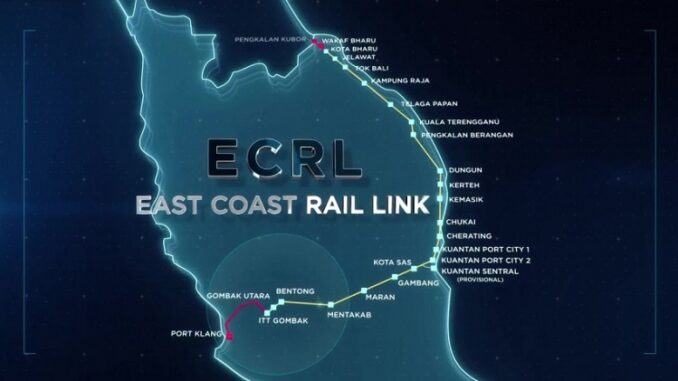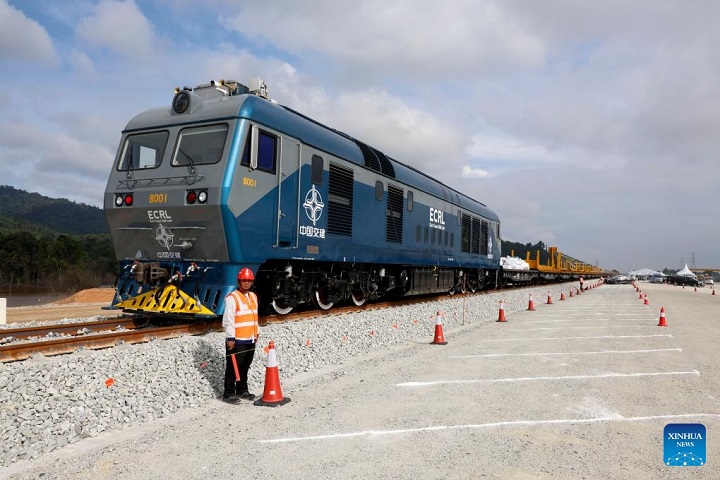
The East Coast Rail Link (ECRL) project is designed to improve connectivity between Peninsular Malaysia’s East Coast and the West Coast states. The ECRL is a key part of China’s Belt and Road Initiative (BRI) in Malaysia, and is part funded by China’s state-owned Export-Import (EXIM) Bank.
Malaysia has a close economic relationship with China, which is its largest trade partner, and has appeared as a BRI focal point. Malaysia signed a Memorandum of Understanding on BRI in 2015, making Malaysia an early BRI participant.
The East Coast Rail Link (ECRL), a 665 km long mega rail project in Malaysia costing around RM 75 billion (US $16 billion), is being built by the China Communications Construction Company (CCCC) had its first tracks laid in mid-December, 2023. The track-laying marks the transition of the project from tunnel construction to above ground construction. By August 2023 the project had project has reached 53 per cent completion.
The ECRL is a 50:50 joint venture of the Malaysian government with the China Communications Construction Company.
Malaysian King Sultan Abdullah Sultan Ahmad Shah attended a ceremony to mark the occasion. Malaysian Transport Minister Loke Siew Fook hailed the project for its benefits to the local economy and the upskilling and technology transfer that the ECRL has made possible. Since commencement of construction in 2017 up to the first quarter of 2023, the ECRL project has engaged over 2,100 local Malaysian companies, encompassing contractors, consultants, and suppliers.
Transport Minister Loke Siew Fook said advanced track-laying equipment from China helps a lot in improving the railway’s construction efficiency. “The track-laying machine is expected to lay approximately 1.5km tracks per day.”
The ECRL is anticipated to contribute a 3.8% increase to Malaysia’s gross domestic product (GDP) by 2047 by enhancing trade, boosting tourism and stimulating regional development, said Tengku Zafrul Malaysia’s Investment, Trade and Industry Minister.

The China Communications Construction Company said the project further strengthened the all-round cooperation with Malaysia, aligning with the development plans of the Malaysian government.
The China-built ECRL linked four underdeveloped areas and will serve as an economic corridor. Once the railway project is completed, the traffic flow will be much easier for people from the West coast to the East. Travel time will be cut in half to about four hours from eight hours by road.
The railway will have a total length of 665 kilometers, with construction commencing in August 2017. The railway starts from Kota Bharu in Kelantan and ends at Port Klang in Selangor by passing through Kelantan, Terengganu, Pahang and Selangor, and is expected to be completed by the end of 2026.
The standard gauge double-track railway line will allow passenger trains to travel at speeds up to 160km/h and freight trains at 80km/h.
The line will have 40 tunnels totalling 69km from Kota Bharu to Port Klang including the 2.8k m-long Kuantan Tunnel, the 1.1 km-long Paka Tunnel and the 871 m-long Dungun Tunnel. The longest tunnel, measuring 7 km, will be built in the Jelebu-Semenyih area. The project will also feature multiple viaducts, totalling 100 km in length.
Sources:
- Railway Technology, February 19 2024. https://www.railway-technology.com/projects/east-coast-rail-link-ecrl-project/
- Global Times, Dec 12, 2023. https://www.globaltimes.cn/page/202312/1303466.shtml
- CIDB Malayasia, October 6, 2023. https://www.cidb.gov.my/eng/enhancing-connectivity-the-east-coast-rail-link